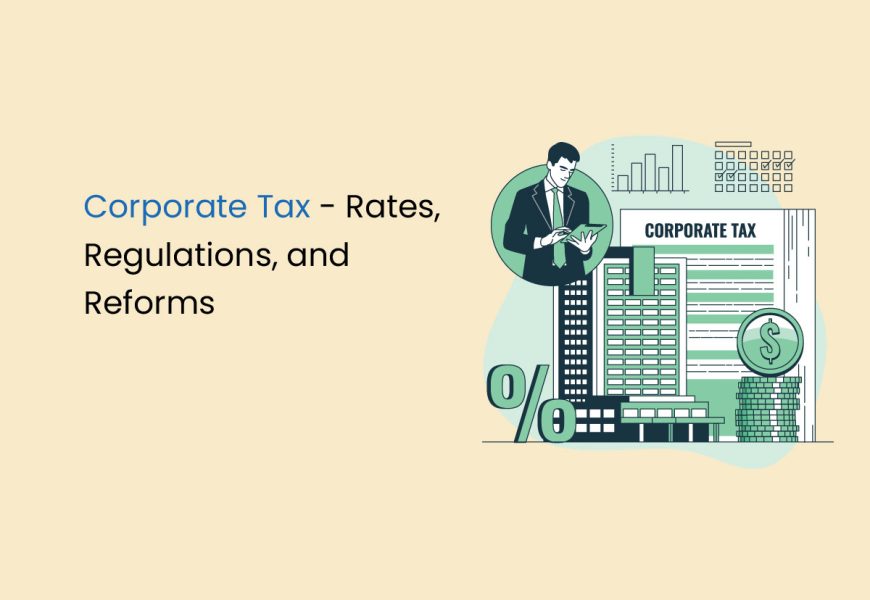In India, people pay significant taxes on income, wealth, and capital gains. Corporate entities, domestic or foreign, must also pay taxes to run their business. One of the taxes that corporations must pay to the Indian government is corporate tax.
What is Corporate Tax?
Corporate Tax is a direct tax on a corporate entity’s net income or profit. According to the Income Tax Act of 1961 provisions, the tax is charged at a particular rate.
The rates at which businesses get charged for corporate tax depend on the profits earned. Corporate tax is typically imposed on a company’s revenues after considering deductions like depreciation, COGS (Cost of goods sold), and SG&A (Selling, General, and Administrative expenses).
Corporations: Definition and Types
A corporation is an independent legal entity that functions with its owners and shareholders. In India, corporations are roughly divided into the following types:
- Domestic Corporations: A corporation established in India under India’s Companies Act, 2013 or foreign-owned but has the control and management wholly based in India is considered a domestic corporation.
- Foreign Corporations: A corporation situated overseas and not based in India is considered a foreign corporation. Even if only a portion of a foreign corporation’s management and control is outside India, it is still classified as foreign.
Domestic companies in India are charged corporate tax on their universal income. In contrast, foreign corporations are charged tax only on the revenue they generate through their Indian operations.
Corporate Tax in India
Foreign and Domestic companies are liable to pay an annual corporate tax. The government in India levies corporate taxes on the net income or profit of the company. The taxes are calculated based on the following types of income:
- Profits are earned by a company when its total revenue exceeds its total expenses.
- A business’s rental income when it lets out its property on rent.
- Capital gains
- Any other source of income, like dividends and interests, is also taxed.
Calculation of Net Income
Corporate tax is calculated based on a company’s net income. Net income is the total income left after making necessary deductions for various expenses. These expenses are as follows:
- Depreciation
- Total Cost of Goods Sold (COGS)
- Selling Expenditures
- Administrative expenses
Net Income = Gross Income – (Expenses = Depreciation)
Corporate Tax Rates
The corporate tax rates applicable for the financial year 2020-21 are as follows:
| Income | Domestic Company (If total turnover is up to Rs. 400 crores) | Other Domestic Companies | Foreign Companies | |||
|---|---|---|---|---|---|---|
| Basic | Effective | Basic | Effective | Basic | Effective | |
| Up to Rs. 1 Crore | 25% | 26% | 30% | 31.20% | 40% | 41.6% |
| Between Rs. 1 Crore and 10 Crore | 25% | 27.82% | 30% | 33.384% | 40% | 42.432% |
| More than 10 Crore | 25% | 29.12% | 30% | 34.944% | 40% | 43.68% |
The effective rate above includes a surcharge, as applicable, and a 4% health and education cess. The surcharge rates are given below:
| Income | Domestic Companies | Foreign Companies |
|---|---|---|
| Upto Rs. 1 Crore | Nil | Nil |
| More than Rs. 1 Crore but up to 10 Crores | 7% | 2% |
| More than Rs. 10 crores | 12% | 5% |
Reduced Tax Rate for certain existing Domestic Companies
Starting from the tax year 2019-20, companies can avail of a beneficial tax rate of 22% (plus a surcharge of 10% and applicable health and education cess of 4%). This beneficial tax rate is only applicable upon satisfying the following conditions:
- The company has not utilised tax exemptions provided to a unit within a Special Economic Zone (SEZ), advantages of accelerated or additional depreciation, investment incentives, spending on scientific research, and specific deductions related to certain income. This excludes deductions associated with hiring new employees and specific income deductions for Offshore Banking Units and International Financial Service Centre.
- The company has not offset loss and unabsorbed depreciation carried forward from previous years, including offsetting any unabsorbed depreciation and any losses relating to loss/depreciation on amalgamation, given such loss is attributable to the deductions referred to above. However, the corresponding adjustment in the written down value of such block of asset as of April 1, 2019, will be allowed in the stipulated manner.
- The option to avail the beneficial rate of 22% is issued in the specified manner by the stipulated deadline for income submission.
- Companies taking up this option have been excluded from the opportunity to use minimum alternate tax (MAT) and MAT credit provisions.
Reduced Tax Rate for newly set-up Domestic Manufacturing Companies and Electricity Generating Companies
Starting from the tax year 2019-20, newly set-up domestic manufacturing companies can avail of a beneficial tax rate of 15% (plus a surcharge of 10% and applicable health and education cess of 4%). Starting from the tax year 2020-21, this beneficial tax rate of 15 % has been extended to domestic companies engaged in generating electricity.
This beneficial tax rate only applies to satisfying the following conditions:
- The company is incorporated on or after October 1, 2019. It must commence production of any article or thing on or before March 31, 2024.
- The ‘company’ is not formed by splitting up or reconstructing a business already in existence (exception given for undertaking formed due to re-establishment, reconstruction, or revival of business).
- It does not use a plant or machinery previously used in India, and no depreciation has been claimed.
- It does not use any building previously used as a hotel or convention centre that has already claimed the deductions under the Income Tax Act.
- The company is not engaged in any business other than the production of an article or thing and research or distribution of said article or thing manufactured. The following businesses will not be treated as manufacturing businesses:
- Development of computer software in any form or media.
- Conversion of marble blocks or similar items into slabs.
- Bottling of gas into a cylinder.
- Printing of books or production of cinematograph films.
- Any other business notified on this behalf.
- The company has not utilised tax exemptions provided to a unit within a Special Economic Zone (SEZ), advantages of accelerated or additional depreciation, investment incentives, spending on scientific research, and specific deductions related to certain income. This excludes deductions associated with hiring new employees.
- The company has not offset loss and unabsorbed depreciation carried forward from previous years, including offsetting any unabsorbed depreciation and any losses relating to loss/depreciation on amalgamation, given such loss is attributable to the deductions referred to above.
- In case of non-fulfilment of certain conditions due to any difficulty in this section, the Indian Revenue Department may issue guidelines for getting rid of the difficulty.
- The option to avail of the beneficial rate of 15% is issued in the specified manner by the stipulated deadline for income submission.
- The domestic transfer pricing provision will apply to these companies.
- Companies taking up this option have been excluded from the opportunity to use minimum alternate tax (MAT) and MAT credit provisions.
Other Corporate Tax Rates in India
The different Corporate tax rates applicable in India are as follows:
Health and Education Cess
The central government levies an education and health cess of 4% on corporate tax plus a surcharge, irrespective of the company’s net income level.
Minimum Alternate Tax (MAT)
Both domestic and foreign companies can have a MAT rate of at least 15%, according to the book profits per section 115JB. If the total applicable tax of a company on their net income is less than 15% of the profit recorded in their books, the company will be liable to pay token tax money in the form of MAT.
Companies taking up the option of a lower tax rate of 22% are excluded from the applicability of provisions of MAT and MAT credit.
MAT does not apply to:
- A foreign company that does not have a permanent establishment in India.
- Foreign companies engaged in the shipping or aircraft business, exploration of mineral oils, civil construction in turnkey projects, and whose income is offered to tax under specific provisions of the Act.
- If a foreign company with a permanent establishment in India earns capital gains from the transfer of securities, royalties, interest, and FTS, and the tax due on this income is below 15%
- Sick companies
- Companies exercising the lower tax rate option of 22% under Section 115BAA
The existing tax rates under MAT are provided in the table below:
| Income* | MAT rate (%) | |||
|---|---|---|---|---|
| Indian company | Foreign company (other than exempted) | |||
| Basic** | Effective*** | Basic** | Effective*** | |
| Less than Rs. 1 crore | 15% | 15.600% | 15% | 15.600% |
| More than Rs. 1 crore but less than Rs. 10 crore | 15% | 16.692% | 15% | 15.912% |
| More than Rs. 10 crore | 15% | 17.472% | 15% | 16.380% |
Note
- A surcharge of 10% is payable only where total taxable income exceeds INR 10 million.
- The basic rate of MAT is 9% of book profits in the case of a corporate and non-corporate taxpayer located in an International Financial Services Centre and deriving income solely in convertible foreign exchange.
- Effective tax rates include surcharge and health and education cess.
Dividend Distribution Tax
Dividend distribution tax is paid by companies on the dividends that are distributed to the shareholders every year. The dividend distribution tax on the dividends distributed to a company’s shareholders is 15% of the gross dividend amount, effectively resulting in a 17.65% levy.
Tax Rebates on Corporate Tax
The tax rebates available to companies are as follows:
- In certain circumstances, domestic corporations can deduct dividends from other domestic companies.
- Venture funds and venture capital enterprises can apply special provisions.
- In some cases, deductions are allowed for exports and new undertakings.
- Installation of new infrastructure and power sources is subject to certain deductions.
- Businesses can carry forward losses for a maximum period of eight years.
- In rare cases, interest, capital gains, and dividends can also be deducted.
Corporate Tax Planning
Business corporations undertake tax planning to maximise profits by reducing their tax payment burden. To achieve this goal, corporations hire professionals who are up to date with all the rules and regulations regarding the laws involving tax payments. Proper corporate tax planning is necessary as every business involves significant financial risk.
Corporate tax planning is very different from tax evasion. Tax evasion is non-payment of tax and is considered an offence punishable by law. Meanwhile, tax planning refers to planning one’s finances to reduce the payable tax amount while maximising gains.
Corporate tax planning has the following objectives:
- Increasing savings
- Economic stability
- Enhancing growth
- Reduction in tax liability
- Minimising litigation
- Making productive investments
Conclusion
Understanding corporate tax is essential for businesses and individuals, as it is a cornerstone of a country’s economic structure. While it functions as a vital revenue source for the government, influencing public services and infrastructure development, its implications extend to shaping business decisions, investments, and overall economic growth. For businesses, the navigation of the complexities of tax regulations is crucial to ensure compliance, manage financial obligations, and optimise profitability. Moreover, corporate tax policies can influence investment decisions, economic growth, and overall business climate.
As taxpayers, being informed about corporate tax helps us comprehend its impact on our daily lives and empowers us to engage in informed discussions about fiscal policies and economic development.
Frequently Asked Questions about Corporate Tax
Is corporate tax a direct tax?
A corporate or company tax is a direct tax levied on a company's net profits.
How is corporate tax calculated?
Corporate tax is computed on a company's net revenue or net income. A company's net income/net revenue is the total amount left with the company after making necessary deductions of various expenses.
What is the difference between corporate and personal income taxes?
Corporate tax is a government-imposed cost for a company and a significant source of revenue for the country. In contrast, personal income tax is a tax on an individual's income, such as wages and salary.
Who pays corporate tax in India?
A company, whether Indian or foreign, is liable to pay corporate tax under the country's Income Tax Act of 1961.
Why is corporate tax necessary?
The money collected from corporate taxes is considered a country's revenue.
What is corporate tax planning?
Corporate tax planning is a means of reducing tax liabilities for a registered company.
Do companies making a loss pay tax?
If the business books show a loss, then no tax is chargeable.
Who is the highest taxpaying company in India?
The highest taxpaying company in India is Tata Consultancy Services or TCS.





















